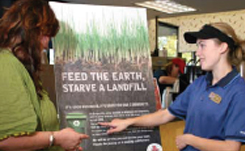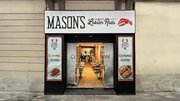Article
Fast casuals find cash in compost
Recycling organic material helps operators reduce waste-hauling costs.

November 17, 2008
This article originally published in Fast Casual magazine, October/November 2008. Although the concept of composting usually evokes an image of a big, smelly pile of rotting food and yard waste, it can actually help a restaurant operator save money.
Vancouver, Wash.-based Burgerville began composting in eight of its restaurants last year and now composts in 24 restaurants. Twenty-one restaurants compost mainly back-of-house waste, while three compost both front- and back-of-house waste.
The company has reduced its trash pickups by 50 percent thanks to its composting program.
"We reduced our garbage hauling and reduced what goes to the landfill, which is a positive thing for the planet," said Jack Graves, chief cultural officer for Burgerville. "And it is a positive thing for the bottom line because it costs us less to have compost removed than it does to have garbage removed."
And at the Tea Spot, a tea bar in downtown Boulder, Colo., founder Maria Uspenski makes 30 to 50 pounds of used tea leaves available each day to local gardeners. Although the Tea Spot only reduced the volume of its weekly trash by about a cubic meter by composting, doing so has won the tea bar many fans among gardeners in the Boulder area.
"They find that the tea leaves are the best kind of organic component that they can add to their own compost," Uspenski said. "We do it because we want to help the local community and it is something that is useful to them."
Reducing the need for fertilizers
The Environmental Protection Agency defines compost as organic material that can be added to soil or used as a medium in which to grow plants. It is created by combining food waste, yard trimmings or other organic material and allowing the mixture to cure.
Mature compost is dark brown or black and has a soil-like, earthy smell.
Compost can suppress plant diseases and pests, reduce or eliminate the need for chemical fertilizers and promote higher yields of agricultural crops, the EPA says. It also can be used to help remediate soil contaminated by hazardous waste.
"About 70 percent of a restaurant's waste stream is compostable," said Steve Kurtz, vice president of FoodServiceWarehouse.com, an online supplier of foodservice equipment and supplies.
FoodServiceWarehouse.com offers information on its Web site showing how operators can get involved in composting or other environmentally friendly initiatives.
Burgerville launched its composting program at the urging of Amaranth Wilson, who was an assistant manager at one of the company's restaurants, Graves said.

"She was doing some work in her own restaurant with recycling, and she thought that because of some of the other things we'd been doing in the areas of sustainability, that we were really missing an opportunity," he said. "She called me and I asked her to do some homework with the trash haulers."
A few months later, when she reported her findings, Burgerville officials realized composting was something they should be paying more attention to, Graves said. The company moved Wilson from the restaurant into the corporate office and designated her as the company's sustainability coordinator.
"In each of the restaurants, there is usually someone who is a champion of it and is the one who drives it," Graves said. "And it is that mentality that Amaranth has identified in the restaurants."
Educating the customer
A restaurant operator can get involved in composting either by investing in an onsite composter, which can turn food waste into compost in a few days, Burke said, or by contracting with a commercial composter. For those who do composting on–site, the finished compost is given or sold to local gardeners or landscaping companies.
| |||||
| This story and all of our great free content is supported by: | |||||
 | Digital Dining As a pioneer in the hospitality point-of-sale (POS) market and as an innovator with regards to functionality and features, Digital Dining can be configured to meet the needs of any environment. | ||||
Burgerville chose to work with a commercial composter. In Clark County, Wash., it was relatively easy to accomplish, he said, because there is only one trash hauler, while in the Portland, Ore., area, where many of Burgerville's restaurants are located, it was more difficult because there were several private haulers to coordinate with.
"Many of them were open to it and wanted to take part, and some did not," Graves said. "We still have some areas where we just aren't able to take on composting at all just because we don't have the structure to support it."
 ChatGPT
ChatGPT Grok
Grok Perplexity
Perplexity Claude
Claude












